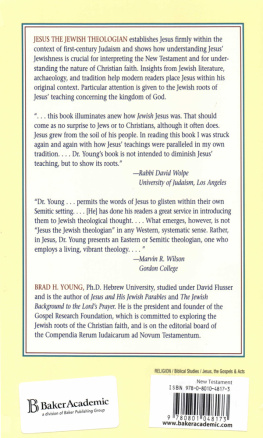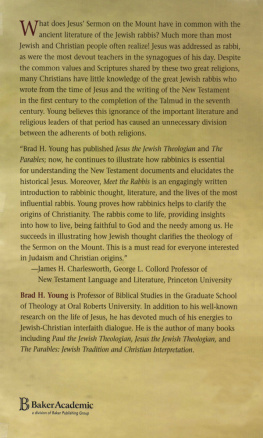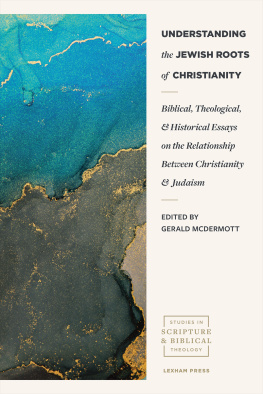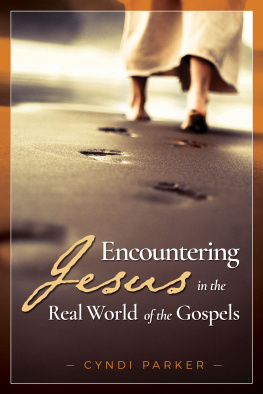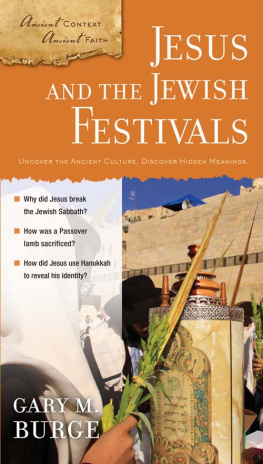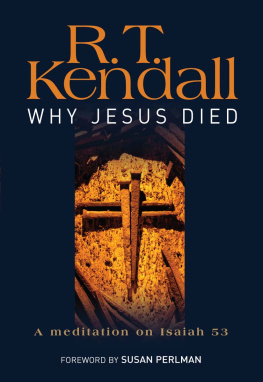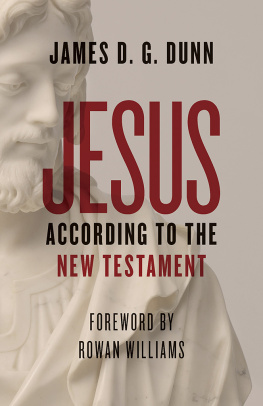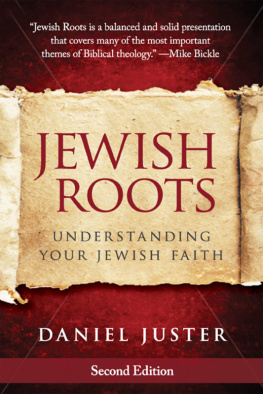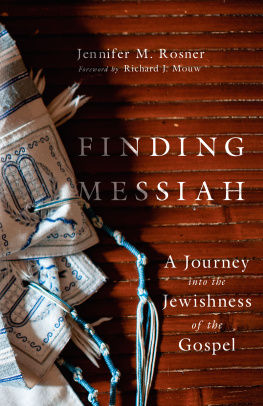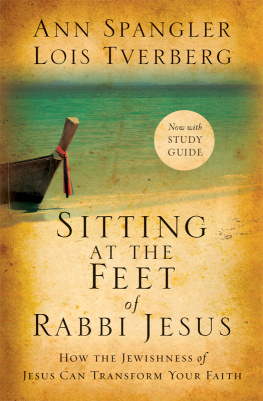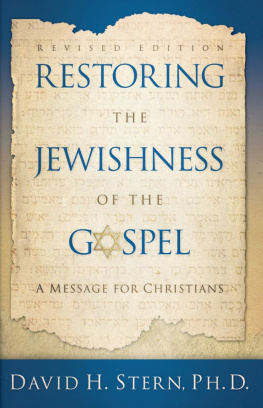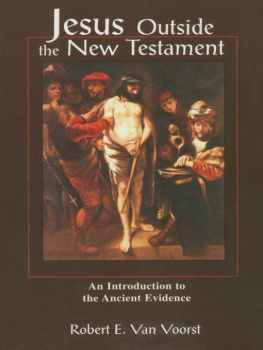Brad H. Young - Jesus the Jewish Theologian
Here you can read online Brad H. Young - Jesus the Jewish Theologian full text of the book (entire story) in english for free. Download pdf and epub, get meaning, cover and reviews about this ebook. year: 1993, publisher: Baker Publishing Group, genre: Religion. Description of the work, (preface) as well as reviews are available. Best literature library LitArk.com created for fans of good reading and offers a wide selection of genres:
Romance novel
Science fiction
Adventure
Detective
Science
History
Home and family
Prose
Art
Politics
Computer
Non-fiction
Religion
Business
Children
Humor
Choose a favorite category and find really read worthwhile books. Enjoy immersion in the world of imagination, feel the emotions of the characters or learn something new for yourself, make an fascinating discovery.
- Book:Jesus the Jewish Theologian
- Author:
- Publisher:Baker Publishing Group
- Genre:
- Year:1993
- Rating:5 / 5
- Favourites:Add to favourites
- Your mark:
- 100
- 1
- 2
- 3
- 4
- 5
Jesus the Jewish Theologian: summary, description and annotation
We offer to read an annotation, description, summary or preface (depends on what the author of the book "Jesus the Jewish Theologian" wrote himself). If you haven't found the necessary information about the book — write in the comments, we will try to find it.
Jesus the Jewish Theologian — read online for free the complete book (whole text) full work
Below is the text of the book, divided by pages. System saving the place of the last page read, allows you to conveniently read the book "Jesus the Jewish Theologian" online for free, without having to search again every time where you left off. Put a bookmark, and you can go to the page where you finished reading at any time.
Font size:
Interval:
Bookmark:

1995 by Brad H. Young
Published by Baker Academic
a division of Baker Publishing Group
P.O. Box 6287, Grand Rapids, MI 49516-6287
www.bakeracademic.com
Ebook edition created 2012
All rights reserved. No part of this publication may be reproduced, stored in a retrieval system, or transmitted in any form or by any meansfor example, electronic, photocopy, recordingwithout the prior written permission of the publisher. The only exception is brief quotations in printed reviews.
ISBN 978-1-4412-3286-1
Library of Congress Cataloging-in-Publication Data is on file at the Library of Congress, Washington, DC.
With much appreciation for their friendship
and with my highest esteem,
this book is dedicated to
Dennis and Georgia Lee Clifton
Table of Contents
Foreword
Rabbi David Wolpe
When Christians write about Jesus, they write with the weight of theology. When Jews write about Jesus, they write with the weight of history. For Judaism the life of Jesus is difficult to isolate from the rift it represented from Jewish history. All the rancor that followedthe pain and persecution, the tentative efforts at understanding sabotaged by hatred, the rejection, belittlement, and horroris the prism through which Jesus has traditionally been refracted for the Jew. To see Jesus as he was is a difficult task because of the legacy left toward the Jewish people by Christianity.
This characterization may seem excessively harsh to a Christian reader. Surely there were times of cooperation and harmony? Indeed such times occurred, although they were fewer than we would hope. But the basic outline was essentially fixed for centuries. Jesus represents a break to Judaism; he is a Jew who became the fountainhead of another faith, a religious child that broke from its parent. Given the subsequent history, what parent could look upon such a child without ambivalence, at best?
Today we live in a new age. Understanding between Jews and Christians, although still not ideal, has reached a point unimaginable to our ancestors. Nonetheless no Jew who takes up his or her pen to write of Jesus can entirely escape the burden of that history. The exploration of Jesus life and teachings can no more be objective for a Jew than it can for a Christianalthough for quite different reasons.
Yet tolerance is a powerful liberator of ideas. In our time, as understanding grows, and respect spreads, Jews can begin anew to explore the life and teachings of Jesus.
Jesus was born to an age of teachers. It was a time of strong views and fractious debate. Time smooths out the wrinkles of the past, so that we begin to talk about the views of the first century, although opening a newspaper today we see how various are human views in any given time. Later tradition imposes an orthodoxy that enshrines debate, and freezes it. Alliances, which are always shifting in real life, become fixed. Ideas that would have been understood then, seem heretical now.
Thus we are constrained by the rigidity of later perspectives. This makes it difficult to see Jesus in his original context. There is another reason why it is so hard to understand Jesus, and that is the simple complexity of any human story. A biographer once asked his audience to imagine, next time they read a biography, how accurate would be even their best friends account of their own love life. Is there anyone who could, with pen and paper, really explain the twists and turns of your own private story? The human heart is so various and secretive that, even for the least complex among us, true explanation of our lives is elusive.
How much more complex is it to account for a character born 2,000 years ago into a different world, whose legacy is interpreted by so many strong-minded and independent followers? The mysteries of the human heart are overlaid with the detritus of history. A reclamation project seems hopeless.
Yet we do have a logical starting point. The place to begin searching for Jesus is in the world in which he grew. His roots were first-century Judaism. What was the world like for a first-century Jew?
Jesus was born at a critical time for the Jewish people. It was a time of transition from a tradition that was bound to a specific land, and a specific temple, into a portable tradition, one that Jews could carry with them throughout their wanderings. The diaspora was invented at the destruction of the first temple in 586 B.C.E. But the final break with the land was not until 700 years later, when the Bar-Kochba revolt was crushed by the Romans. After the destruction of the second temple, and the leveling of the land, Judaism proceeded to forge itself into a new modelrabbinic Judaismwhich has survived and flourished until our day.
The greatest spirits of rabbinic Judaism, such as Hillel and Akiba, lived within 100 years of this time. The world into which Jesus was born, for all its problems, was bursting with religious creativity. First-century Judaism was filled with debate and diversity. Even within the confines of rabbinic Judaism, argumentation was the order of the day. To debate the meaning of life or the minutiae of the law was the reigning passion of rabbinic scholars. In a poignant talmudic passage, Rabbi Johanan mourns the loss of his colleague Resh Lakish because Rabbi Johanan can find no other rabbi who could so ably and vigorously disagree with him!
The rabbinic tradition is much studied today, but for a long time it was moribund in the Christian world. Christianity was concerned about Judaism up until the time of Jesus, but after that Judaism was irrelevant, a curio in the display case of world religions. Today, however, Christian scholars are beginning to understand that much of what Judaism preserved is what Jesus would have known. It may be that a fifth- or sixth-century rabbinic midrashlegendperpetuates a tradition that Jesus would have taken for granted. In a world of oral transmission, the date something is finally written down can be haphazarda product of pure chance. A rabbinic legend that survives in a tenth-century manuscript may have been known, assumed, or even alluded to by Jesusand instantly recognized by his audience.
The world of first-century Judaism inherited much, but bequeathed even more to the generations that followed. Vivid apocalyptic imagery, elaborations of ancient law, stories and legends, gentle teachings of Gods love, and ripe images of Gods revengeall of this and more swirled around the pious lives of first-century Judaism. And all of it took place in the confines of a Roman Empire with little more than a mild curiosity toward these God-intoxicated peasants.
Jesus lived in a textual world. Most important to Christianity is a life; most important to Judaism is a book. That is why the most popular work of Christian spirituality is Thomas Kempis Imitation of Christ. There is in Christianity an ideal life. But for Jesus himself, there was no such model. His own life was dictated by the notion of ideal texts. No Jewish spiritual work advises its reader to be like Moses; it counsels, rather, to try to follow the writings of Moses and his later interpreters.
Judaism was not only textual by choiceit was textual by virtue of the narrowness of the ancient world. We have a variety of informational sourcestelevision, radio, an endless array of books. For the rabbis of the first century, intellectual energy was absorbed by the Bible. It was not simply that the Bible was memorizedit was their touchstone in every life experience. Life was sketched against a background of quotations embedded in the soul. Everything was referred back to the text, from daily work, to family, to extraordinary experiences. Rabbinic documents are so densely allusive not because the rabbis were straining to display erudition, but because the rabbis were educated Jews and as such lived those texts. The stories and laws of the Bible were common coinage. They were the yardstick against which life was ceaselessly measured.
Next pageFont size:
Interval:
Bookmark:
Similar books «Jesus the Jewish Theologian»
Look at similar books to Jesus the Jewish Theologian. We have selected literature similar in name and meaning in the hope of providing readers with more options to find new, interesting, not yet read works.
Discussion, reviews of the book Jesus the Jewish Theologian and just readers' own opinions. Leave your comments, write what you think about the work, its meaning or the main characters. Specify what exactly you liked and what you didn't like, and why you think so.

